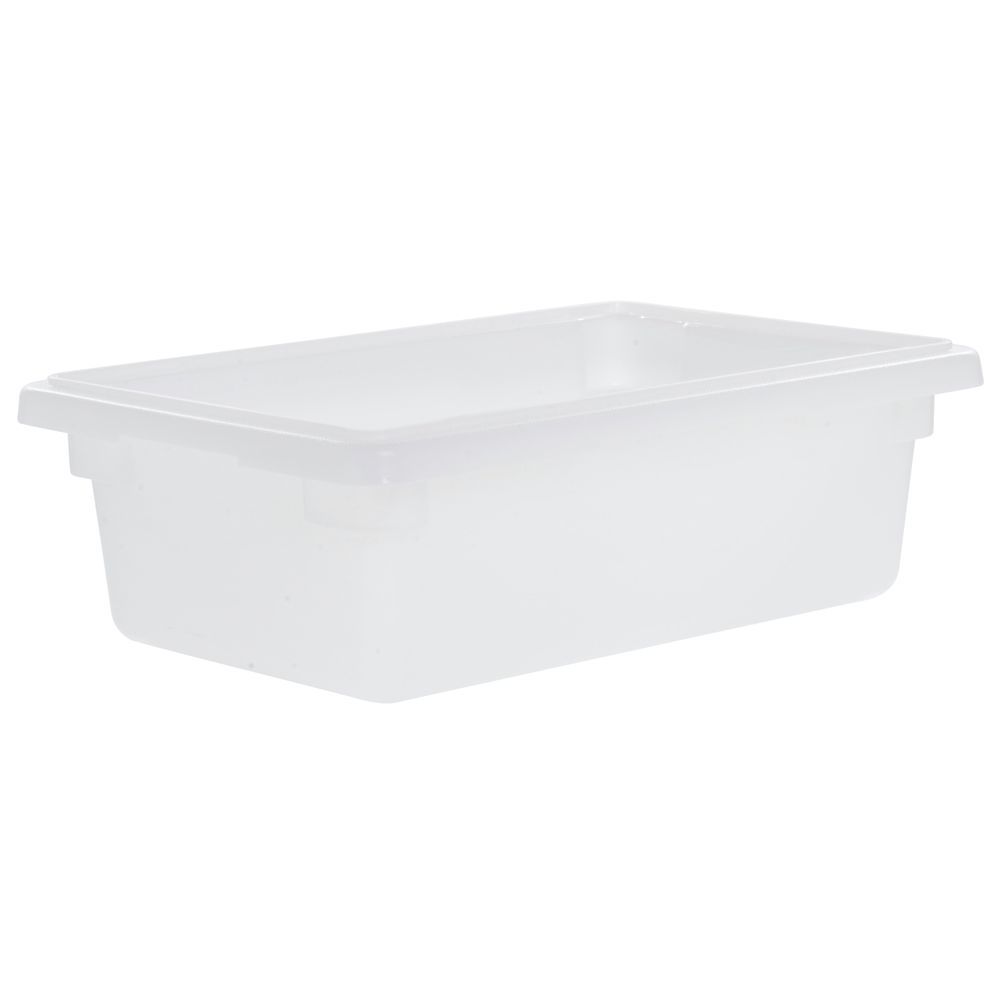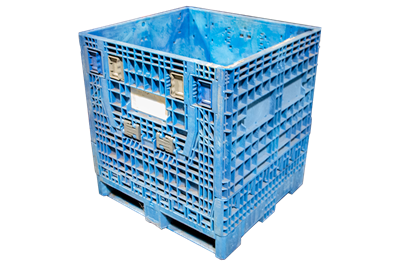Discover how durable Bulk Plastic Containers can streamline your storage solutions
A Comprehensive Guide to the Different Sorts Of Bulk Plastic Containers Available Today
Bulk plastic containers play a critical role in different industries, providing remedies for storage space and transportation. Their varied kinds deal with various demands, from rigid alternatives for solid products to flexible containers suiting numerous forms. Each type provides distinctive benefits, making it important to understand their applications and attributes. As markets advance, so do the demands for efficient container options. What variables should one consider when picking the appropriate bulk container?
Summary of Mass Plastic Containers

Types of Bulk Plastic Containers
Mass plastic containers can be found in numerous kinds, each fit to particular applications. Inflexible mass containers, adaptable bulk containers, and intermediate mass containers stand for the main classifications, each offering special advantages. Comprehending these types is crucial for selecting the right container for moving and keeping materials.

Rigid Mass Containers
Inflexible bulk containers are important for effective storage and transportation of different materials across sectors. These containers are normally constructed from durable plastics, allowing them to endure rough handling and ecological problems. They are available in numerous shapes and dimensions, consisting of totes, bins, and drums, making them ideal for saving whatever from granular compounds to fluids. Inflexible containers often feature strengthened walls and secure lids, making sure the contents stay shielded throughout transportation. Their stackable design maximizes storage space, making them suitable for storage facilities and manufacturing facilities. In addition, many stiff mass containers are recyclable and recyclable, adding to sustainability efforts. In general, their toughness and flexibility make stiff mass containers an important component in supply chain procedures.
Adaptable Bulk Containers
Flexible mass containers, frequently referred to as adaptable intermediate mass containers (FIBCs), function as a flexible service for storing a selection and delivering of completely dry materials. These containers are generally made from woven polypropylene and are designed to be light-weight yet solid, permitting efficient handling and piling. Their versatility enables them to suit different sizes and shapes, making them suitable for items ranging from grains to chemicals. FIBCs can be geared up with features such as spouts for simple dental filling and discharge, in addition to safety coverings for enhanced longevity. Furthermore, they are multiple-use and recyclable, adding to sustainable methods in sectors like farming, food processing, and building. On the whole, flexible bulk containers supply a affordable and effective choice for mass product administration.
Intermediate Mass Containers
Intermediate bulk containers (IBCs) are vital for the reliable transport and storage space of fluids and granular materials throughout various markets. These containers typically have a capability varying from 275 to 330 gallons and are developed for very easy taking care of and stacking. Made from long lasting materials like high-density polyethylene or steel, IBCs offer superb security against contamination and ecological aspects. Their style consists of features such as an integrated pallet for forklift accessibility and a removable top for simple dental filling and cleaning. IBCs are commonly made use of in chemical, food, and pharmaceutical industries, making certain compliance with security laws. Their flexibility and reusability make them a cost-effective service for bulk storage space and transport, adding to supply chain efficiency and sustainability.
Features and Benefits of Mass Plastic Containers
Mass plastic containers are essential devices in various industries, providing a combination of toughness and usefulness. These containers are created from high-grade products, making them resistant to influences, chemicals, and ecological aspects. This toughness warranties product security throughout storage and transport.
Furthermore, mass plastic containers are lightweight, helping with ease of dealing with and reducing delivery expenses. Their stackable design makes best use of storage space effectiveness, permitting optimized stockroom room. Numerous models include safe lids or closures, giving a closed seal that avoids and maintains components contamination.
Mass plastic containers are recyclable and often recyclable, adding to lasting practices. Their adaptability enables a vast array of applications, from food storage space to industrial use, boosting their value across markets. Businesses gain from the long life-span and low upkeep requirements of these containers, making them an affordable solution for both lasting and short-term demands.
Industries That Utilize Mass Plastic Containers
Various markets gain from making use of mass plastic containers, each leveraging their unique residential properties for specific applications. The food and drink market relies on these containers for safe storage and transport of items, while the chemical manufacturing market utilizes them for managing unsafe products. Furthermore, the find out pharmaceutical circulation requires emphasize the significance of durability and tidiness in product packaging solutions.
Food and Beverage Industry
As the demand for efficient and risk-free storage space remedies proceeds to rise, the food and beverage sector increasingly depends on bulk plastic containers for their functional needs. These containers offer durable, lightweight, and functional options for storing ingredients, completed items, and waste materials. Made from food-grade materials, they guarantee conformity with health and wellness criteria. Numerous styles, such as stackable bins and tote boxes, maximize room during transport and storage space, improving logistical effectiveness. Furthermore, the transparency of some bulk containers enables very easy stock administration, decreasing the risk of perishing. With the market's focus on sustainability, several suppliers are now using recyclable and recyclable options, straightening with green methods while fulfilling the high demands of food safety and security and hygiene.
Chemical Production Market
The chemical manufacturing market depends greatly on bulk plastic containers for the risk-free and efficient storage space of raw products, intermediates, and completed items. These containers are developed to endure numerous chemicals, guaranteeing that unsafe materials do not leakage or break down the container itself. Common kinds consist of high-density polyethylene (HDPE) and polypropylene containers, which supply superb chemical resistance and durability. Their lightweight nature and stackable style help with transportation and storage, maximizing room in producing facilities. Additionally, lots of bulk plastic containers feature features such as tamper-evident seals and easy-to-read labeling, boosting safety and conformity with industry guidelines. In general, mass plastic containers are important to the chemical manufacturing process, giving reputable solutions for managing varied substances.
Pharmaceutical Distribution Requirements
Drug distribution relies on bulk plastic containers to satisfy rigorous safety and regulatory demands. These containers are necessary for delivering and saving a variety of pharmaceutical products, including energetic pharmaceutical ingredients (APIs) and completed medications. Their design assurances security versus light, contamination, and wetness, maintaining the honesty of delicate materials. Additionally, mass plastic containers are compliant with sector criteria such as Excellent Production Practices (GMP) and are usually made from products that are FDA-approved. Making use of these containers boosts effectiveness in the supply chain, enabling secure, large circulation while lessening waste. Business in the pharmaceutical market focus on using long lasting, watertight, and tamper-evident containers to ensure product safety and quality throughout the logistics process.
Factors to consider for Picking the Right Container
When picking the appropriate bulk plastic container, various variables need to be meticulously considered to ensure perfect functionality and safety and security. The nature of the materials to be saved is vital; compatibility with the container's product can influence stability and safety. Bulk Plastic Containers. In addition, the container's shapes and size need to align with the storage and transport requirements, guaranteeing efficient room usage
Lots capability is another vital factor to visit consider, as it needs to suit the weight of contents without threat of damages or failure. The style functions, such as venting or lids, can impact usability and access. Compliance with market guidelines is necessary, particularly in fields like pharmaceuticals, where safety requirements are strict.
The anticipated life-span and toughness of the container ought to be assessed to verify it meets the functional needs without constant substitute. By reviewing these elements, one can pick the most appropriate bulk plastic container for particular applications.
Ecological Impact and Sustainability
As companies progressively focus on sustainability, the environmental effect of mass plastic containers has actually come under examination. These containers, frequently made from products such as polyethylene or polypropylene, add significantly to plastic waste otherwise taken care of properly. Their production involves the usage of nonrenewable fuel sources, which can bring about raised greenhouse gas exhausts. Improvements in reusing technology and the development of biodegradable choices are aiding to minimize these concerns.
Numerous manufacturers are taking on techniques that highlight the use of recycled products, consequently decreasing the demand for virgin plastics. The resilience of bulk plastic containers additionally contributes; they are made to be recycled several times, which can lessen their total environmental footprint when contrasted to single-use choices. Ultimately, the market faces the obstacle of balancing functionality with environmental obligation, making lasting methods vital for the future of mass plastic containers.
Best Practices for Storage and Transport
Efficient storage space and transportation of mass plastic containers considerably influence both functional performance and sustainability. To maximize room, companies must stack containers firmly, guaranteeing security and protecting against damage. Correct labeling is necessary for simple identification, which simplifies access processes. Additionally, keeping a well organized and tidy storage area minimizes the risk of contamination and improves security.
For transport, picking the best automobile is vital; containers must be safeguarded to stay clear of changing during transportation. Companies need to additionally consider using pallets to promote simpler loading and dumping. Normal examinations of containers for damage can protect against costly substitutes.
Temperature control is another essential element, as severe conditions can endanger the honesty of the plastic. Lastly, training employees on ideal practices for handling and transportation guarantees compliance and advertises a culture of safety. By implementing these best practices, services can improve their operational efficiency while adding to ecological sustainability.
Often Asked Concerns
Just how Do I Tidy Mass Plastic Containers Properly?
To tidy mass plastic containers properly, one ought to rinse them with warm water, utilize a mild detergent and scrub with a soft brush. Wash thoroughly, then permit to air dry totally before storage or reuse.
What Is the Life-span of Bulk Plastic Containers?
The life-span of mass plastic containers commonly ranges from 5 to 10 years, relying on the material, use, and environmental conditions. Appropriate upkeep and storage space can significantly expand their functionality and toughness in time.
Can Mass Plastic Containers Be Customized?

Do Bulk Plastic Containers Have Guarantee Options?

Exist Laws for Utilizing Mass Plastic Containers?
Yes, regulations exist for making use of bulk plastic containers, mostly concentrated on safety, ecological impact, and material compliance. These policies ensure that containers fulfill market criteria and appropriate for transferring different materials securely and successfully.
Stiff mass containers, adaptable mass containers, and intermediate bulk containers represent the key classifications, each offering distinct advantages. Versatile bulk containers, typically referred to as flexible intermediate mass containers (FIBCs), offer as a flexible option for delivering and storing a variety of dry products. The chemical manufacturing sector relies heavily on mass plastic containers for the risk-free and efficient storage of raw products, intermediates, and completed items. Bulk Plastic Containers. These containers are created to endure numerous chemicals, guaranteeing that dangerous products do not leakage or deteriorate the container itself. In addition, mass plastic containers are compliant with market criteria such as Excellent Manufacturing Practices (GMP) and are often made click this link from materials that are FDA-approved